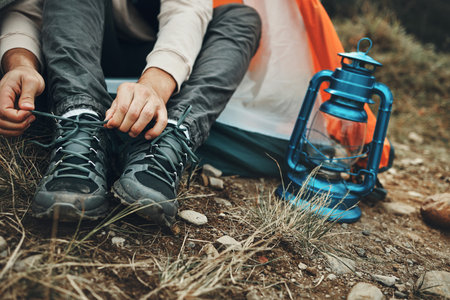1. Understanding Sustainable Camping in the UK
Sustainable camping has become an essential part of enjoying the great British outdoors, especially as families and friends seek ways to connect with nature while caring for the environment. In the UK, sustainable camping goes beyond simply picking up litter or recycling; it’s about embracing traditions that respect both the countryside and local communities. Many British campsites encourage campers to follow the Countryside Code, a set of guidelines that helps everyone enjoy and protect natural spaces. These expectations include leaving no trace, respecting wildlife, and supporting local businesses. The rolling hills, ancient woodlands, and picturesque coastlines of Britain are treasures that generations have enjoyed, so protecting them is more than a trend—it’s a shared responsibility rooted in national pride. When we camp sustainably, we’re not just safeguarding beautiful landscapes for ourselves but also ensuring future generations can experience the same sense of wonder and belonging in the British countryside.
Choosing Eco-Friendly British Campsites
When planning a family camping adventure in the UK, choosing a campsite that puts sustainability first is a wonderful way to care for nature together. Not only does this encourage children to appreciate and protect the environment, but it also helps preserve the beautiful landscapes we all love exploring. Here’s how you can identify eco-friendly campsites across Britain:
Tips for Selecting Sustainable Campsites
- Look for Green Accreditations: Many UK campsites proudly display awards like the Green Tourism Award or David Bellamy Conservation Award. These recognitions ensure the site follows responsible waste management, energy conservation, and supports local wildlife.
- Check Their Environmental Policies: Reputable sites often share their green credentials on their websites—look for mentions of recycling facilities, renewable energy use, and water-saving initiatives.
- Ask About Local Sourcing: Sites committed to sustainability may offer locally sourced products or support nearby businesses, reducing carbon footprints and helping communities thrive.
- Eco-Friendly Facilities: From composting toilets to solar-powered showers, these features highlight a genuine commitment to green practices.
Key Accreditations and What They Mean
| Accreditation | Description | What It Means for Campers |
|---|---|---|
| Green Tourism Award | Awarded to businesses meeting high standards in sustainability, energy efficiency, and community support. | You can expect environmentally friendly operations throughout your stay. |
| David Bellamy Conservation Award | This recognises sites that actively conserve wildlife and habitats, and engage in sustainable land management. | The site will be rich in biodiversity—perfect for curious young explorers! |
| Campsite Environmental Charter | An internal code of conduct many independent campsites follow to reduce their environmental impact. | Campsites are mindful about waste, energy use, and protecting natural spaces. |
A Parent’s Tip for Peace of Mind
If you’re unsure about a campsite’s eco-credentials, don’t hesitate to call ahead. Ask staff how they minimise their environmental impact—most will be delighted to share their efforts! This not only reassures parents but also sparks meaningful conversations with children about caring for our planet. Choosing thoughtfully means your next family camping trip can be both adventurous and kind to nature.

3. Minimising Environmental Impact: Practical Tips
When it comes to sustainable camping in the UK, every small action counts. As families set up their tents in the heart of Britain’s beautiful countryside, it’s important to remember that looking after the environment ensures these precious places remain unspoilt for generations to come. Here are some practical, everyday steps campers can take to tread lightly and care for nature during their adventures.
Responsible Waste Disposal
One of the simplest ways to minimise your environmental footprint is by managing your rubbish responsibly. Always bring along reusable bags or containers for sorting waste, and make sure all litter—including food scraps—is taken away or disposed of in designated bins provided by the campsite. Many British campsites offer recycling facilities, so separate your plastics, glass, and paper where possible. Never leave rubbish behind, as even biodegradable items like fruit peels can harm local wildlife and spoil the natural beauty.
Conserving Water
Water is a precious resource, especially in rural areas. Use refillable water bottles instead of single-use plastics, and encourage children to turn off taps tightly after use. When washing dishes or brushing teeth, collect water in a basin rather than letting it run continuously. Some eco-friendly campsites provide rainwater collection points—make use of these if available to reduce demand on local supplies.
Sensible Energy Use
Be mindful of energy consumption while camping. Choose solar-powered lights or torches instead of battery-operated ones, and try cooking with low-impact methods such as portable gas stoves or fire pits only where allowed. Never gather wood from the surrounding area, as this disrupts habitats; instead, purchase locally sourced firewood if fires are permitted.
Respecting Local Wildlife and Habitats
Stick to established footpaths and pitches to avoid trampling delicate plants and disturbing animal homes. Remind children not to pick wildflowers or chase animals, as these small actions help preserve biodiversity. Observe birds and other creatures from a respectful distance using binoculars—nature-watching can be a delightful family activity without leaving a trace.
Leave No Trace Principles
Adopting the “leave no trace” mindset is key to sustainable camping across Britain. Before departing your pitch, double-check that nothing has been left behind—not even tent pegs! Encourage everyone in your group to do a final sweep of the site together; it’s a simple way for families to bond while caring for the countryside.
4. Camping Gear: Going Green
When planning a sustainable camping adventure at British campsites, the gear you choose plays a crucial role in reducing your environmental footprint. Opting for environmentally friendly camping equipment not only helps protect the beautiful landscapes of the UK but also sets a positive example for young campers learning about green living.
Why Choose Eco-Friendly Camping Gear?
Traditional camping gear can often contain non-recyclable plastics or materials that harm the environment. By selecting items made from sustainable sources, you’re making a mindful choice for nature and for future generations.
How to Source Green Camping Equipment in the UK
The UK offers a growing market for eco-friendly camping gear, with several local suppliers dedicated to sustainable practices. When shopping, look for products that use recycled materials, organic cotton, bamboo, or responsibly sourced wood. Many British brands now also prioritise low-impact manufacturing processes and minimal packaging.
Checklist: What to Look For
| Item | Sustainable Material Option | Recommended UK Supplier |
|---|---|---|
| Tents | Recycled polyester or organic cotton canvas | Vango Eco Collection, Alpkit |
| Sleeping Bags | Recycled insulation fibres | Mountain Warehouse Eco Range |
| Cooking Gear | Bamboo utensils, stainless steel cookware | Barebones Living UK, Wildo UK |
| Lamps & Torches | Solar-powered lights, rechargeable batteries | Go Outdoors, Decathlon UK |
| Clothing & Footwear | Organic cotton, recycled polyester, vegan leather boots | Finisterre, Patagonia UK, Vivobarefoot |
| Water Bottles & Flasks | Stainless steel or BPA-free recycled plastic | Klean Kanteen UK, Chillys Bottles |
Additional Tips for Sustainable Shopping
- Buy Local: Supporting British brands cuts down on transport emissions and supports local businesses.
- Second-hand Options: Consider borrowing or buying pre-loved gear from charity shops or online marketplaces such as Gumtree and Freecycle.
- Circular Economy: Some suppliers offer repair services or take-back schemes for old equipment—always check before buying new!
- Avoid Single-use Items: Choose reusable plates, cutlery, and water bottles to reduce waste during your stay.
A Family-Friendly Approach to Greener Camping Gear
If you’re introducing children to camping in the great British outdoors, involve them in picking out eco-friendly items—let them choose a colourful bamboo cup or help research which tents are best for the planet. These small moments spark curiosity and build lifelong habits of caring for our natural world together.
5. Respecting Local Wildlife and Landscapes
One of the most magical parts of camping across Britain is the opportunity to immerse yourself in its rich tapestry of wildlife and stunning landscapes. From the rolling hills of the Lake District to the ancient woodlands of Sussex, British campsites are often nestled within or close to areas teeming with native flora and fauna. As responsible campers, it’s important that we not only enjoy these natural wonders but also protect them for future generations.
Appreciating Nature Without Disturbance
When exploring the countryside, keep to marked paths and designated trails wherever possible. This simple act helps prevent soil erosion and protects fragile plant life that might otherwise be trampled. If you’re lucky enough to spot deer grazing at dawn or hear the melodic song of a skylark, remember to observe from a respectful distance. Avoid feeding wild animals, as this can disrupt their natural behaviours and diets.
Guidelines for Protecting Native Flora
Britain is home to beautiful bluebells, ancient oaks, and rare wildflowers—some of which are protected by law. Teach children to admire flowers without picking them and remind everyone to avoid removing stones or logs that may shelter small creatures. When setting up camp, pitch your tent on established pitches rather than clearings in sensitive habitats such as meadows or heathland.
Respecting Unique Habitats
Many campsites are adjacent to Sites of Special Scientific Interest (SSSIs) or National Parks. These areas are home to unique ecosystems that require extra care. Follow local signage and any advice provided by campsite staff about protected zones or breeding seasons for birds and mammals. If you’re walking dogs, keep them on leads near livestock or nesting wildlife.
Leave No Trace Philosophy
The ‘Leave No Trace’ principle is especially relevant in the British countryside. Take all your rubbish home—even biodegradable items like orange peel can harm local species and spoil the landscape for others. Minimise campfire use by opting for portable stoves where permitted, as fires can scar the land and endanger habitats.
By following these gentle guidelines, you’ll be doing your bit to preserve Britain’s wild beauty while creating treasured family memories in harmony with nature.
6. Community and Responsible Camping
One of the most heartwarming aspects of camping in Britain is the opportunity to connect with local communities and truly immerse yourself in the spirit of the countryside. When we camp, we’re not just visitors—we become temporary neighbours, sharing spaces, stories, and sometimes even a friendly wave over a morning cup of tea. It’s important to engage respectfully with these communities, remembering that our actions can have a lasting impact on the people and places we visit.
Supporting small British businesses is a wonderful way to give back. Whether you’re picking up farm-fresh eggs from a nearby stall, enjoying a pint at the village pub, or buying handmade crafts at a local market, your choices help sustain rural economies. These personal touches not only enrich your camping experience but also ensure that these charming communities continue to thrive for generations of campers to come.
Following established codes like the Countryside Code is essential for responsible camping. The Countryside Code reminds us to respect everyone, protect the environment, and enjoy the outdoors responsibly. Simple acts—such as leaving gates as you find them, keeping dogs under control, and taking all litter home—help preserve the beauty and tranquillity of Britain’s landscapes. Sharing these practices with your family sets a gentle example and fosters mindful habits in young explorers.
When we embrace responsible camping and community engagement, we create a ripple effect of kindness and care. Each little act—be it supporting a local business or following countryside etiquette—nurtures trust between campers and residents. In turn, this makes our campsites more welcoming for future adventures and keeps the magic of British camping alive.

